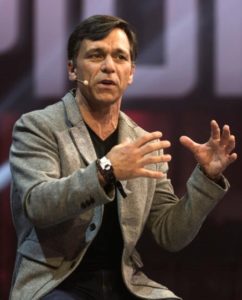

Guillermo Söhnlein is a social entrepreneur focused on the exploration and sustainable settlement of extreme environments on land, sea, and space. He currently serves as an Independent Corporate Director for various companies while supporting entrepreneurial ventures pushing humanity into new frontiers.
After serving as an officer in the United States Marine Corps, Guillermo co-founded a speech recognition technology company in Silicon Valley during the peak of the Internet Boom. This started a 22+-year career working with innovative startups in the technology, aerospace, and marine industries. He has helped launch 7 for-profit ventures and 3 nonprofit organizations, including several space-related efforts, such as:
- 2003 – International Association of Space Entrepreneurs
- 2006 – Space Angels Network
- 2009 – OceanGate
- 2011 – Sea-Space Initiative
- 2013 – Blue Marble Exploration
- 2014 – Ansible Space Communications Systems (now RBC Signals)
As co-founder and CEO of OceanGate, which designs, builds, and operates deep sea manned submersibles, he organized and led 6 ocean exploration expeditions. In 2012, he was admitted to The Explorers Club of New York.
Guillermo received his A.B. in Economics from the University of California at Berkeley and his J.D. from the University of California’s Hastings College of the Law in San Francisco. He currently resides in Zurich, Switzerland, with three grown children living in Atlanta, USA.

What is your background, where did you grow up?
I was born in Buenos Aires, Argentina, but I grew up in what is now Silicon Valley and went to college and law school in the San Francisco Bay Area. Although I’m a lawyer by training, I went straight into the Marine Corps after law school and straight into my first startup after leaving active duty. That launched me on a 22-year career working with startups (10 of my own), entrepreneurs, and early-stage investors.
Bottom line: I’m a “space guy” who has absolutely no science or engineering education, training, or experience.

When did you first become interested in space?
I have a clear and distinct memory of a dream I had when I was 11 years old: I was living on Mars as the commander of the first human colony there.
How specific is THAT for an 11-year-old?!
I wasn’t going to “space” in general, but to MARS in particular.
I wasn’t going to Mars just on a temporary mission (and returning to Earth), I was living there PERMANENTLY.
I wasn’t just a colonist, I was the COMMANDER.
I wasn’t at an established colony, but at the FIRST colony.
I guess it was not surprising that Captain Kirk was one of my childhood role models and that I grew up with a passion for leading people into uncharted waters.

What do you think the biggest issue facing the industry today?
How’s this for a contrarian response? NONE
I really don’t see a single “biggest” issue, nor do I see any major issues that cannot be overcome. Instead I mostly just see growing pains, at least when I take a high-level view.
Over the past 18+ years that I have been involved in space, I feel like I have watched humanity undergo a major transition from having space be the exclusive purview of a small handful of large national programs to a diversified global private space economy. With any such disruptive shift, there are bound to be issues. However, as our species moves forward, we will find ways to resolve them and continue our growth.

What do you like to do for fun?
Day-to-day, I like to work out (weights and running) and play guitar.
Bigger picture, at some point in a post-COVID 2021/2022 I’d like to get back to doing “for fun” what I used to do “for work”, namely, organizing deep ocean exploration expeditions using manned submersibles.

What is your favorite movie and why?
Europa Report, because I believe it struck the right balance between scientific/technical accuracy about a deep space mission and artistic license to tell a compelling story.

What are some of your favorite books?
Science Fiction:
Seveneves by Neal Stephenson
Ender’s Game by Orson Scott Card
Red Mars, Green Mars, Blue Mars by Kim Stanley Robinson
Fantasy:
The Chronicles of Thomas Covenant by Stephen R. Donaldson
Non-Fiction / Business:
Tipping Point by Malcolm Gladwell
Corps Business: The 30 Management Principles of the U.S. Marines by David H. Freedman

What are you reading now?
I’m happy to say that right now I am too busy to be reading anything.

Where do you see the space industry in ten years?
First and foremost, I REALLY hope that in the next ten years we will finally move past using the term “space industry”. It is NOT an industry, but instead it is simply a geographic location where other industries operate. Perhaps it helps to draw the analogy to the Internet, which, in its early days, was called the “Internet Industry” but quickly became just an environment in which other industries operate. As I always ask “space” entrepreneurs: what industry are you really in? Elon Musk does not run a space company, but rather a transportation services company. It just happens that his customers pay him to take their cargo to a geographic location that is incredibly difficult to reach.
[steps off his soap box]
One reason it is incredibly difficult to answer this question in 2020 is because of the ever-accelerating rate of change that humanity has been experiencing around space starting in ~2015 (only five short years ago!). That was right about when Google acquired SkyBox Imaging (the first prominent “exit” for a VC-backed space company), SpaceX started ramping up the operational tempo for its Falcon 9, and China’s central government opened up its space sector to private investment. The past five years have been absolutely overwhelming and breathtaking, especially for those of us who have been working on this for a longer period of time. With so many new developments occurring around the world on a daily basis, it is near-impossible to keep up with everything. And this makes any sort of long-term prediction equally near-impossible.
With that as a complete copout, I will offer just a single (perhaps obvious) prediction:
As humanity continues to transition to a diversified global private space economy, we will see a rate of change, innovation, and growth like we have never seen before under the old government-focused paradigm. Think “Internet/E-Commerce/Mobile in 2000-2010”.

What would you tell people just starting out in the space industry?
I’m going to interpret this broad question in a specific way: what would I tell people just starting out in the space industry but who have experience in other industries? (This is what I did 18 years ago)
My Answer(s):
(1) don’t think that you can’t be “in space” just because you don’t have the “right” background, education, or training (i.e., science or engineering); because
(2) remember that your non-space experience is PRECISELY the value you bring to the table.
I have spent the better part of two decades helping people like me (i.e., non-space people) transition into the space world. In 2003, I started the International Association of Space Entrepreneurs specifically to help entrepreneurs with success in non-space ventures to launch new space ventures. In 2006, I started Space Angels Network to do the same for individual investors to take their non-space experience and support space ventures. Why did I do this? Because I firmly believe that “space” is not an “industry” but rather a “geographic location” (see my rant above). What humanity needs is a much more diversified talent pool for space businesses. Of course, we will always need scientists and engineers. However, we also desperately need more professionals with expertise in marketing, finance, sales, HR, operations, manufacturing, etc., as well as experience and professional networks in specific industries like tourism, entertainment and media, pharmaceuticals, medical devices, insurance, natural resources, banking, advertising, health care, education, defense, environmental protection, etc.

